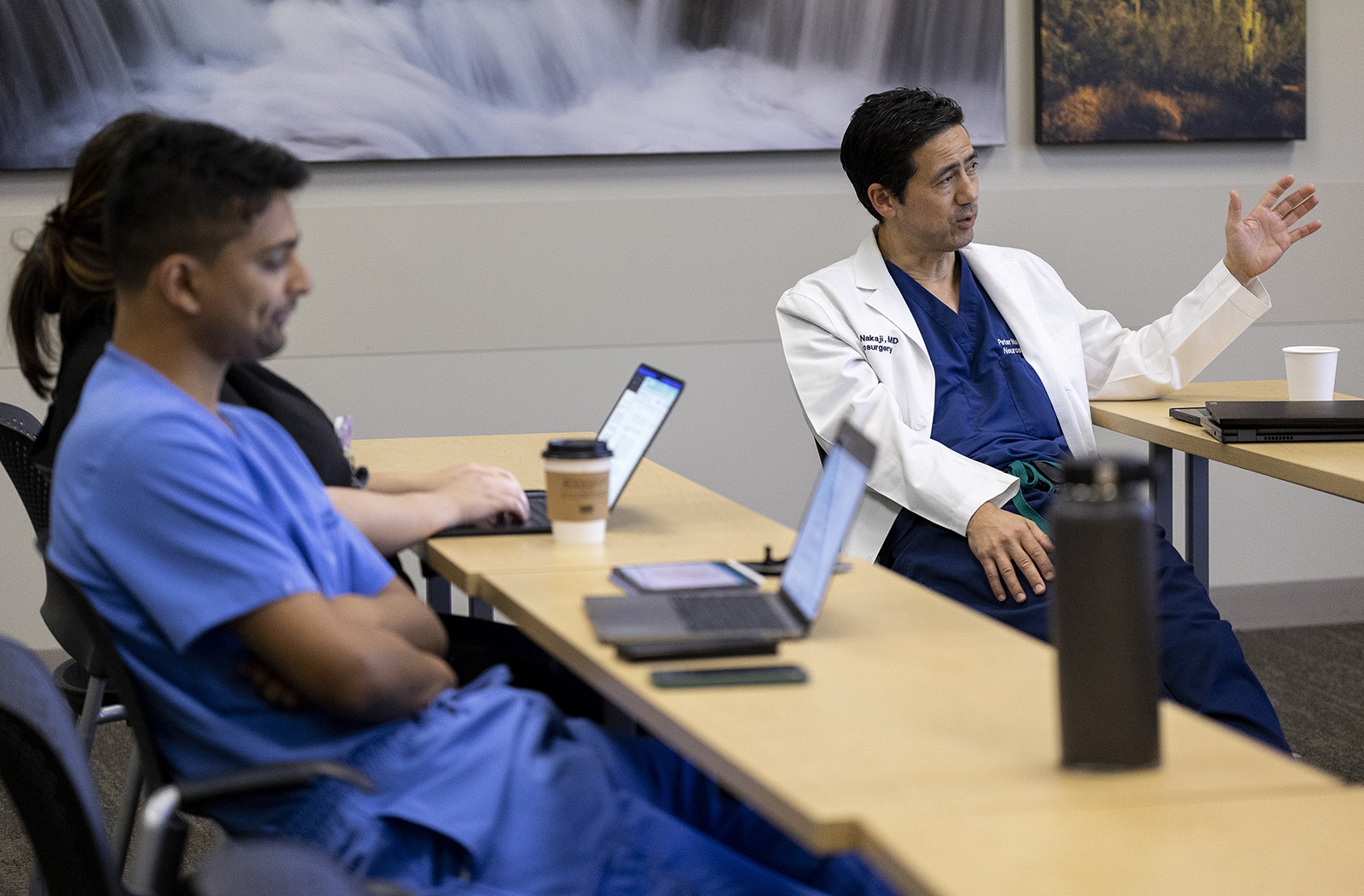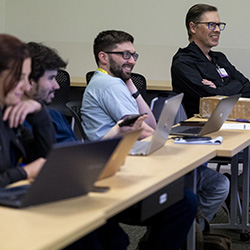
Neurosurgery Department Research Hub is Innovating Care

The University of Arizona College of Medicine – Phoenix’s Department of Neurosurgery at Banner – University Medical Center Phoenix oversees a flourishing research hub committed to discovering better treatments for patients while contributing to advancements in the field.
The field of neurosurgery is ever evolving and has seen significant shifts in procedures over the last decade, including smaller incisions and more thoughtful approaches with use of technology to minimize the impact on patients. “That’s greatly shifted the way surgery is done. Outcomes are better and people recover faster.” said Robert Bina, MD, assistant professor of Neurosurgery and alumnus from the Class of 2013.
In addition to seeing patients, Dr. Robert Bina, conducts research to find new ways to innovate seizure focus treatment for patients with intractable epilepsy.
Research led by Dr. Bina and Peter Nakaji, MD, chair of the Department of Neurosurgery at Banner – University Medical Center Phoenix, studies the function of neurotransmitters as they relate to decision-making, the imaging characteristics of lymphoma and how to speed up the diagnosis of tumors.
To engage medical students, residents and practicing physicians in the neurosurgery field, Dr. Nakaji instituted “Project Waterfall,” which aims to foster a collaborative environment between professionals of different experience levels.

“The idea of Project Waterfall is that there is more relevant education that occurs within closer proximity in your training,” Dr. Bina said. “A second-year medical student has more relevant information to teach a first-year medical student than a senior attending or junior attending who hasn’t been in medical school for more than 10 years.”
The department created a flourishing learning environment in partnership with the Neurosurgery Interest Group (NSIG) — comprised of students, residents and faculty.
As a collective, Project Waterfall submitted a total of 46 abstracts to the Congress of Neurological Surgeons (CNS). That number puts the program among the top ten of most abstracts submitted.
CNS is the leading organization dedicated to advancing neurosurgery through education and innovation. Once a year, the organization hosts a meeting where neurosurgeons from around the world come together to show off their research.
Annie Pico, a first-year medical student at the college, is the vice president of NSIG and co-runs Project Waterfall. She said that the student-run research group incorporates all levels of training for attendings, fellows, residents and medical students. This helps to keep the model sustainable.
“We meet every other week to give project updates, introduce new projects and update people on our results,” Pico said. “It’s a very collaborative environment, and everyone works hard to put out meaningful research.”
Kristin Nosova, MD, a neurosurgery resident at Banner – University Medical Center, participates in the discussions in Project Waterfall and the NSIG. She said the conversations with faculty and students have been helpful in learning new material.
“Because Dr. Bina and Dr. Nakaji are so involved with the students in these groups, the students get a lot more comfortable with attending early on,” Dr. Nosova said. “Residency is hard no matter what, but there are ways to make it a productive struggle.”
For the department, the overall goal is to have trainees that become capable, compassionate neurosurgeons that are helping the communities they serve.
“We want to become a major academic neurosurgery department,” Dr. Bina said. “We want to engage in meaningful research that is not just outcome-based neurosurgical research, but actual translational research going from basic science to positively impacting human lives.”
About the College
Founded in 2007, the University of Arizona College of Medicine – Phoenix inspires and trains exemplary physicians, scientists and leaders to advance its core missions in education, research, clinical care and service to communities across Arizona. The college’s strength lies in our collaborations and partnerships with clinical affiliates, community organizations and industry sponsors. With our primary affiliate, Banner Health, we are recognized as the premier academic medical center in Phoenix. As an anchor institution of the Phoenix Bioscience Core, the college is home to signature research programs in neurosciences, cardiopulmonary diseases, immunology, informatics and metabolism. These focus areas uniquely position us to drive biomedical research and bolster economic development in the region.
As an urban institution with strong roots in rural and tribal health, the college has graduated more than 1,000 physicians and matriculates 130 students each year. Greater than 60% of matriculating students are from Arizona and many continue training at our GME sponsored residency programs, ultimately pursuing local academic and community-based opportunities. While our traditional four-year program continues to thrive, we will launch our recently approved accelerated three-year medical student curriculum with exclusive focus on primary care. This program is designed to further enhance workforce retention needs across Arizona.
The college has embarked on our strategic plan for 2025 to 2030. Learn more.